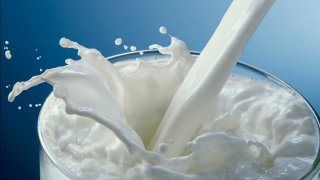
A dozen children and two adults were served floor sealant instead of milk at a day care summer program at an Alaska elementary school after containers were apparently mixed up, the school district superintendent said Wednesday.
Several students complained of burning sensations in their mouth and throats, and at least one child was treated at a hospital after the Tuesday morning incident in Juneau, Superintendent Bridget Weiss said.
Juneau police are leading the investigation of how the mix-up occurred, “not really because we believe there’s anything criminal or mal-intent at this point, but we do want a thorough investigation of what happened, how it happened, and they’re trained investigators," Weiss said.
The incident happened while students in the day care program at Sitʼ Eeti Shaanáx̱-Glacier Valley Elementary in Alaska’s capital city were served breakfast. The program is for kids ages 5 to 12.
Get Tri-state area news delivered to your inbox.> Sign up for NBC New York's News Headlines newsletter.
All food items including milk from a dispenser were provided by a contractor and served by staff. The breakfast items were put on trays, which students took to tables to eat.
Shortly after, children began complaining that the milk tasted bad and caused burning sensations in their mouths and throats.
After school district and contract personnel looked at the container label, it was discovered the clear plastic bag of milk that had been placed in the dispenser was actually a floor sealant that resembles the milk.
U.S. & World
Poison control officials were contacted as well as parents. Two of the children who were picked up by their parents may have sought medical advice, the district said.
Weiss said the milk and the floor sealant, which is also a milky, white substance, both come in large plastic bags that are stored inside cardboard boxes. For the milk, the pouch is removed from the box and placed inside the dispenser to serve with meals instead of in cartons.
Both the milk and sealant were stored at a district commodity storage site off campus.
Weiss said that somehow, boxes with sealant in large pouches were “stored or moved on the same pallet as large pouches of milk that were also in cardboard boxes.”
“We don’t know how that happened, but they were all put on the same pallet,” she said. “That pallet was delivered, and the assumption was that it was milk because that’s what we thought was being delivered.”
Part of the investigation will be to determine why food items were stored in the same building as chemicals.
There was no odor or chemical smell to the sealant, but school standards dictate that any chemical used must have a low ingestion risk.
“That was true of the sealant, so our students are doing fine,” she said. A couple of children still had upset stomachs Tuesday evening, but many others were feeling well, she said.
The sealant was removed and placed in chemical storage, and the school district had a state food inspector on site Wednesday morning to verify all proper protocols were in place.
“We are up and running today,” she said.



